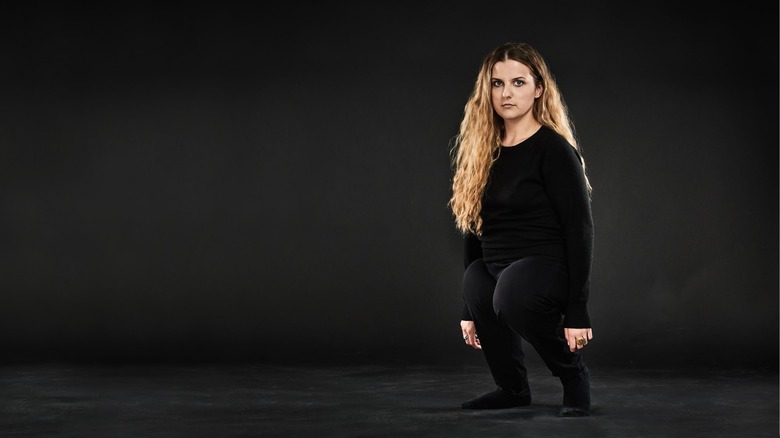Is There Anybody Out There Review: A Deeply Personal Story Of Disability, Identity, And Self-Love [Sundance]
It feels good to look at the state of the film industry and say, "Hey, it's 2023 and we've come a long way, baby." We've got representation out the wazoo! Activists, you can finally go home and get some rest.
Sadly, that's just not the reality we live in. It's a truth writer-director Ella Glendining knows all too well. She was born with an extremely rare disability — so rare, in fact, that she's never even seen another body quite like hers. What is familiar to her, however, is the ableism she faces on a near-constant basis. The dominant societal message is that people like her should not exist, not when there are painful, intrusive medical interventions that could make her look more "normal."
Through her intensely personal documentary "Is There Anybody Out There," Glendining explores what it means to have a physical disability like hers and the ways in which social pressures marginalize and undermine those experiences. Growing up, she was acutely aware of being different, and that has given her a deep desire to connect with others like her. Thanks to social media, that becomes possible; however, what she finds is largely a culture of people with similar disabilities who opt for extremely invasive and painful "corrective" surgeries in childhood. Whether they mean to or not, these people — many of who are kind and well-meaning — are perpetuating the idea that it is better to suffer in an attempt to reclaim some socially accepted concept of "normalcy" than the accept and even love the body you have because it's normal for you.
Glendining begins the documentary with a home movie of her dancing in her room. It sets the tone for the rest of the 87-minute film: her body is different from what we're used to seeing onscreen, but she derives pleasure from her body exactly as it is. Ultimately, the documentary's central question is "why fix it if it ain't broke?"
A different kind of disability documentary
I suspect that "Is There Anybody Out There" could be very eye-opening for audiences with little first-hand experience with disability. In many ways, the film serves as an antidote to the kinds of "stories" we're used to seeing on TLC ("Little People, Big World," "Abby & Brittany"). Often, these present the experiences of disabled individuals in an entertainment-first manner that is not interested in challenging preconceived notions or inciting meaningful change. Rather, it's the opposite: audiences are encouraged to admire the "struggles" of those on the screen and to feel good about these people overcoming obstacles — without really considering why those obstacles exist in the first place (or how easily we could all remove them). In the words of my good friend Derek, a disability artist and activist, it's "inspiration porn."
It's so rare, and so rewarding, to get a story like "Is There Anybody Out There," straight from Glendining's unfiltered perspective. It's neither feel-good nor exploitative; there are none of the intrusive, objectifying lingering shots on her body. There's no sad score playing over shots of her struggling with day-to-day activities. We do get some medical scenes, but those are either largely unrelated to the disability (like her giving birth to her son) or from archival footage. Those open to the messages will come away from the documentary with a better understanding of why people with disabilities feel marginalized as well as the often simple solutions to making spaces more inclusive, like lowering the height of light switches.
Is There Anybody Out There struggles to balance ideas
Where "Is There Anybody Out There" stumbles is in execution. I found the documentary dragged; it had a loose, home-movie feel that I personally do not like. I didn't enjoy it with the Peter Jackson series "The Beatles: Get Back." I didn't enjoy it in Charlotte Wells' "Aftersun." A lot of people like both of those, so I may be in the minority here.
The other main issue I have is Glendining's myopic focus on her own life, experiences, and — more problematically — biases. The documentary is set up as her looking for other people with similar disabilities, but when she does, we don't actually get to know them. Not enough care or time is spent on making these figures three-dimensional, fleshed-out people. Glendining is inadvertently doing the very thing she is condemning: using their experiences as the fifth business to her own story. The result is that she, a director making a movie about herself, comes across as self-involved. Overall, I'd argue it hurts the film's credibility.
To make matters work, there's a lack of objectivity that becomes increasingly obvious as the film goes on. Glendining is a little too quick to label something "ableist." She makes her unexpected pregnancy part of the documentary, but then doesn't include her boyfriend, the father, because then he'd be "the non-disabled hero" (what?). When she interviews a doctor who dedicated his practice to addressing her specific disability because it was being ignored by the medical community at large, she villainizes him and puts words in his mouth (he tells her she wouldn't be a good candidate for surgery because of her age — she later laments that he called her a "lost cause," which is definitely not what he was saying). I can appreciate that she's coming from a place I don't have personal lived experience, and I think she is correct most of the time — and she is entitled to feel the way she feels (full stop). I just don't think the documentary benefits from including these raw, unfiltered, off-the-cuff sentiments.
I agree with Glendining's overall argument that our society does not do enough to accommodate all types of bodies. The number of times I've strained my herniated back lifting my kids to reach the sink in a public washroom ... just make sinks lower! Build things with ramps instead of stairs. Make doorways wide enough to accommodate mobility devices. I think "Is There Anybody Out There" tries a little too hard to exaggerate problems in society to make its central point, and it didn't need to. For example, it repeatedly shows 50-year-old footage of people discussing disability (which is shocking, to be fair), but obviously, that's not representative of attitudes today. It's important history, but it's not the current reality, and I think its repeated inclusion distracted from the more relevant content — like Glendining struggling to find employment or her friend being told she's not "really autistic" by strangers. The real meat in "Is There Anybody Out There" is the recent authentic experiences, and unfortunately, this is sometimes overshadowed by other, ancillary elements in the documentary.
Ultimately, this is Glendining's story, and she has a right to tell it however she damn well pleases. And at the end of the day, I'm happy "Is There Anybody Out There" made it to Sundance.
/Film Rating: 6.5 out of 10


